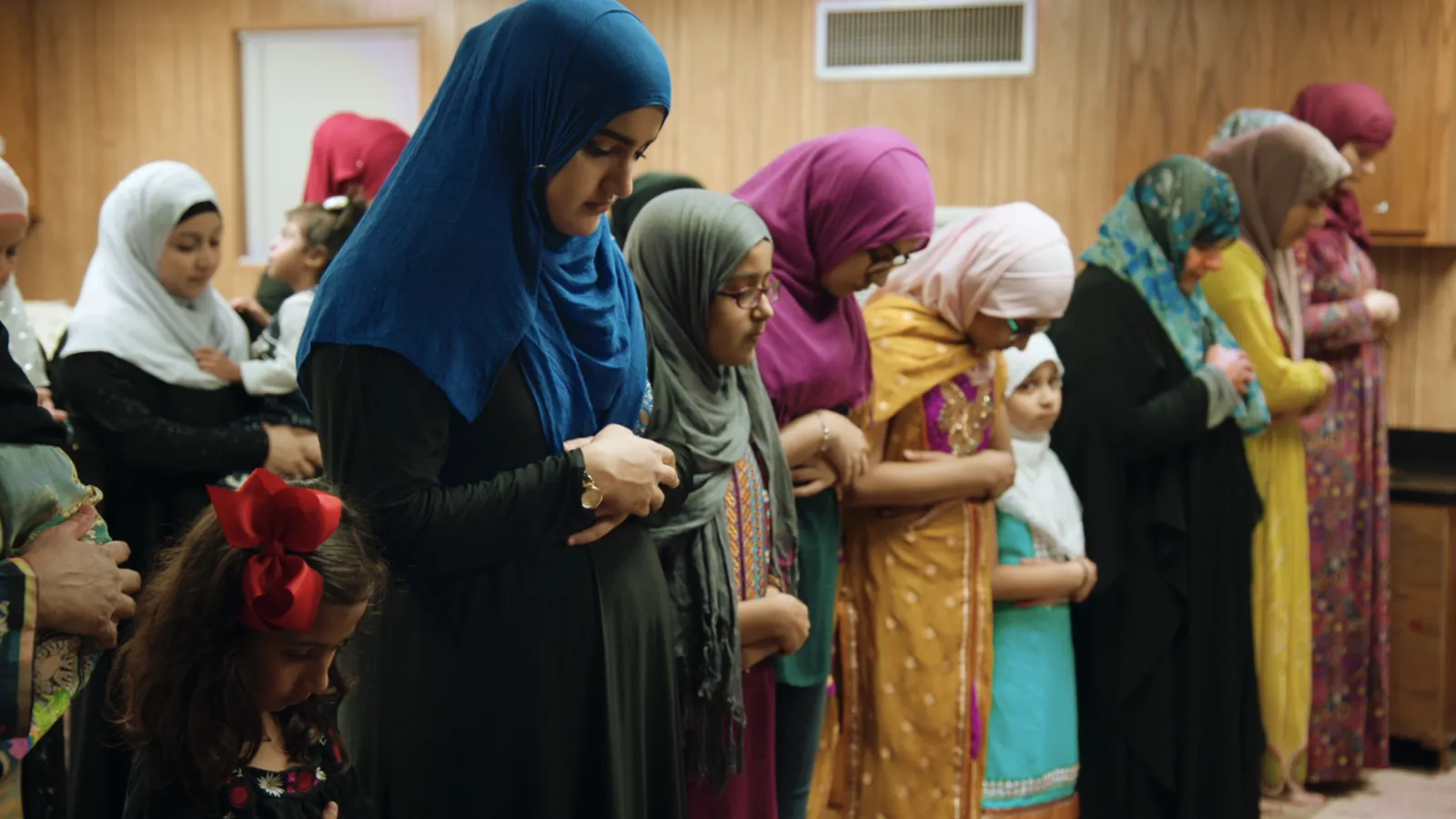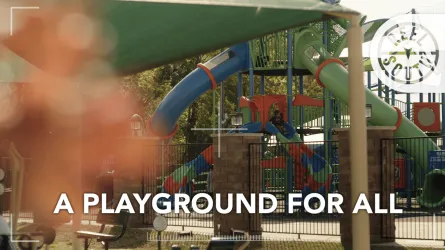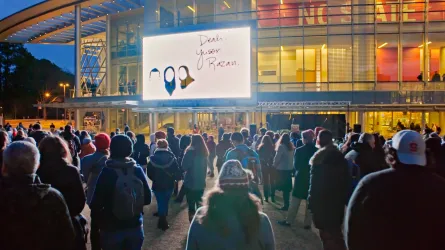When the local mosque in Victoria, Texas is burns to the ground in an apparent hate crime, the town must overcome its age-old political, racial, and economic divides to find a collective way forward. "A Town Called Victoria" is a Reel South and Independent Lens co-production created by Li Lu. Before the national premiere of the series, Reel South media producer Heather Leighton-Nunerley sat with Li to speak about the creation of her three-part docu-series. Get a sneak peek of the film here and start watching the series on Nov. 13.
This interview has been edited for clarity and length.
Heather: What is the number one lesson or sentiment that you would want viewers to learn or to take away from this series?
Li: I really hope that viewers can think about their own communities as they watch this story of Victoria. We made this series to entice and encourage audiences to think about their role in their own community. It's very easy to have a story of Victoria on screen for folks to analyze and perhaps critique, but I think that if it can also offer some self-critique to say, 'Do I know my neighbors? Do I know who is my city council person? If there is a local mosque or synagogue, especially during this tender time, have I reached out to them to let them know that I'm a neighbor who cares for their well-being?' Little small acts like this. I really hope audiences can feel empowered to be an active member of their block, of their zip code after watching this because I think the story of Victoria tells you what happens when those little things don't happen. And people are left in the lurch of feeling like they aren't cared for, especially after an act of hate. For example, there was an incredible outpouring of support to the mosque the day after the fire, but the series continues the story for a year afterward. Who was there after a year and who are their allies that are still there with them to go through the more difficult waters of trying to rebuild and rehabilitate the mosque? That was the biggest takeaway, for sure.
Heather: Was that something that kind of developed as you developed to the film, kind of leaning into that theme? Or was it something that you kind of thought of from the very start?
Li: I think I definitely noticed at the beginning. I had a question, "What's going to happen a year later from this moment?" The initial outpouring of support was so wonderful, but being from South Texas myself, I just knew the realities of communities like this, and I was curious to keep filming and developing and keep in touch with the folks in Victoria to see what might happen. What will this journey of rebuilding this mosque actually be? It's easy to say that was a great news story, everyone feels good about it, but I just knew that time would tell. This whole reflexive, sort of rhetorical element of the series where audiences can think about their own communities, and it developed more as we filmed because participants were saying in their interviews, "Is every community like this? Is this what we're experiencing normal?" How many people have been to the other side of their towns, visited a mosque, or even knocked on their neighbor's door on their block and know everyone's name? So much of the culture of small towns, especially in the South, is that neighborliness. I feel a bit of that has been chipping away as we go into modernity and into the future. So, yeah, I think it was something that I felt very innately within it was cumulative through everyone's, you know, wants it asks, we're also wondering the same thing.
Heather: Both being from Houston, we have this perspective of "small town culture" and it's very "everyone knows everyone" and everyone knows the latest gossip and knows who their neighbors are. So I agree that that was kind of a shock when you see silos still being very prominent in a small town. I definitely do wonder...
Li: The nature of small towns has just changed so much. These were communities where you had to depend on each other, and that has two ways of going about it. It can be very frustrating, in a way, or it can be very freeing to say, "You know what, I know that person and I know that person is a good person." And so much of what the times are now is that the noise in the outside world, not only national but global, infiltrates into these small communities and changes the perception of someone you might have known for 20 years. For example, Omar Rachid told us on the panel that after the mosque fire, some people didn't know that he was Muslim and stopped talking to him, because he was "out" in a way as a member of the Muslim community. I feel like the strength of the small communities is also the one thing that can help them survive in this day and age because there are so many small communities in Texas, and they're just getting smaller.
Heather: It's so interesting that you worded it as Omar being "outed," because that's exactly what I thought as well. When he said that during the panel a few weeks ago. It's interesting because instead of people realizing, "Oh, I now have a different perception of this person because of my own internal biases." They instead, lean closer into their bias and double down on it, instead of acknowledging that, "Hey, maybe I need a rewiring in my own perception and biases of other people." It's sad, but hopefully, projects like this can, as you said, make people analyze their communities and their perceptions of other people. You touched on this earlier about that initial outpouring of support and how it slowly dwindled as time went on. If people wanted to support Victoria Islamic Center, how would they go about that? Or is there another way that you would hope that people kind of take the message that you're trying to relay and give back to their society in some sort of way?
Li: It's a great question. When will your piece be on the blog? Because right now, we're working on an aspect of our website that allows people to donate directly to some of the top most organizations doing incredible work in town, including the Victoria Islamic Center. (That's to come soon, folks)
Additionally, people can seek out the mosque. They have a website, which they have a donation portal. I mean, they still need a lot of donations, because, you know, there's still ongoing security needs and resources needed for their community. So I would encourage folks to look up their website and donate virtually.
I would also encourage folks to look at Midcoast Family Services, which is a board that Omar Rachid serves on and we see him in a meeting in the series. They are an incredible organization. They deal with domestic abuse, homelessness, and substance abuse, and they do a lot of incredible work for housing and rental assistance and supporting families, women, and minors.
And lastly, I want to include Christ's Kitchen. Christ's Kitchen is a soup kitchen that we see in episode two. The woman who runs that is truly, truly a living saint. Trish is her name and she works day in and day out to serve a hot meal, no judgment, no anything to anyone who comes to her door and I can tell you that that dining room in Victoria is the most diverse dining room you'll see the whole town. From families to young children to people of all different backgrounds. You can see how poverty really does affect anyone and everyone. So those three orgs I would say would be great to include.
Heather: Do you have any present-day updates about the members from the series to share?
Li: Well, I don't want to go too much into the politics of what's going on in Gaza and Israel. But I do want to share that Abe Ajrami, one of our main characters, has sadly lost over 20 people within his family in Palestine.
It's been really tough for the congregation to hold space not only for him but for other people from Palestine who are also just worried about their family members, trying to get in touch with them, and trying to relay information as soon as they get it from here in the United States. It's been really tough. And it's been really tough in general because unfortunately, we're seeing an uptick of incidents at mosques and synagogues regarding vandalization and arson. Never did I think that we would be releasing the story in such a backdrop, but to hope that I can speak for the whole congregation, I think we all hope that communities can watch the story of Victoria, a story that's fully realized from the beginning to end of what an incident can do within the community and get some wisdom, get a path, and get some ideas about how to make the community stronger.
Heather: I am so sorry to hear this and it truly is a remarkable environment we're releasing this series in. In the past, you mentioned you almost didn't take the project on due to a death in your family. Despite this, you carried on. What advice would you give filmmakers who are facing difficult choices like that?
Li: I mean, I think that filmmakers are constantly bargaining on well-being and the well-being of the subjects that they're fighting really hard to tell. So I would say, for filmmakers to not ignore what they're processing in their own lives and their own situations, alongside the needs and the story of others.
Heather: Yeah. I think that is probably the challenge that a lot of professionals across the board do but even more so in the creative landscape, because you really rely on other people's stories at a very specific point in time as well. And once that point in time is gone, it's gone. And it's hard to get that back and recreate it, which leads us really well into our next question, which is, were there any moments that you wished you captured but didn't or couldn't for whatever reason? Within the creation of the series?
Li: I think at this point, I feel like we've got everything we needed. Everyone that I pretty much asked to interview agreed to be a part of this project, and I really let that guide me as to who was to be included in this portrait of this town. I think we do a really good job of basically trying to make sure that this community portrait was complete as much as we could.
There are conservative voices and progressive voices. There are young voices. There are elders. We really wanted to make a sense of a complete portrait of this town, multifaceted, as well. People have asked, "Did you get to interview the suspect or the arsonist? Sitting where I am now, I actually feel it's a much stronger piece that we get to know him through other people and his actions. We get to know him also through his family and the mother of his kids. I think it creates a more [complete] portrait of who he is, and more so, why this happened. So yeah, I just want I feel like the reasons I don't have any regrets or wants, in terms of what we could have gotten.
Heather: What are what are some ideas about how to make their community stronger? What wisdom do you think you would be able to share?
Li: I think it's about people showing up to say, "I'm with you. I see you. I'm so sorry this is happening. If there's something I could do. I'm happy to bring over resources. If there's a community potluck." I mean, a lot of these mosques have the same kind of community potluck as the Victoria's congregation has which they are open to the public and everyone's included. Just for folks to get to know each other. It's like any church. There's tradition in southern churches where the church's doors are never locked, right? And it's this idea that like, there is a need and a want for inclusion in our communities. So [you] just have to make the step to make it happen. I think there's a lot of ideas you can sort of glean from watching the story. And also just seeing the insular experience of folks that are seemingly doing fine after a hate crime occurs.
Heather: Their strength and resilience is astounding. Throughout the entire film. At the same time, you also did a very good job on capturing the underlying emotion and pain associated with it. So kudos to you and bravo. It's a very moving series. Finally, what is next for you? This obviously has been quite a large undertaking, and then the following promotion of this. But do you have anything any new projects or ideas to potentially share of what might be next for you?
Li: I am just ready to rest for myself. I think it pairs perfectly with your first question, which is how to center on your own needs. For me, I need a lot of rest, creative rest, physical rest, spiritual rest, after this comes out into the world. I have a couple of narratives and other kinds of ideas and opportunities down the line, but I am looking forward to sort of recharging, and I think it's important for filmmakers to also take that time to recharge before just diving into the next thing. You have to realize this was like six years of my life. That's a big chunk, a good chapter in my life. So I've definitely grown in that six years. So it's time for thinking about what the next project would be to bring meaning and value.
Heather: Was that always something that came natural to you, of realizing that you also need rest or was that something that you had to learn?
Li: Definitely.
Heather: Definitely something you had to learn?
Li: Yeah, I mean, you're taught that this is a cutthroat business, and there's always someone around the corner who can take on any opportunity that you're not taking on herself and work smarter harder and grind as all you can. But, there's a period of time and especially when we're younger were I think that's okay. But the biggest thing I've learned in the six years is about my mental health and burnout. What it looks like. What it feels like. I'm in that stage right now, because we're just trying to get ready to get this released out into the world in a safe enough way for folks right now, too, which is a lot of responsibility that I feel personally towards this moment. But I definitely have learned a lot about my bandwidth and sometimes on a moment to moment versus making sure that you get enough sleep and eat lunch every day. That--that's pretty big.
Heather: Lunch is important. I tell my husband that all of the time.
Li: Exactly, little things like that seem simple and basic, but especially with the way that life moves these days with all of these tools or technology or supposedly making things easier, I think they just make things easier to compound on top of each other. Definitely gift yourself time to think and take stock of how you're moving in the world, versus just getting things off your to-do list.
Heather: I think that's very wise very, very wise. Are there any additional comments that you would like to add? Anything I didn't cover?
Li: So much passion and the energy that's kept me going is that this story showcases a community that has existed in the South for quite some time. And I myself as a Chinese American, growing up in a place as diverse as Sugar Land, I just don't think people understand how diverse and rich the South is. So much of what I also felt after this incident was that I was here in California and so many of my neighbors were like, "Oh, I didn't know that there was a Muslim community in Texas." It's just preposterous to think about if you're from there, but it just also showed me at that time in 2017 how disconnected we were as a country. Like we didn't know who we are.
There are going to be things that they say that audiences will agree with and won't agree with, but we showcase people as they are. And I really hope that this opens the perception of who exists in these spaces in the South, you know?
Category
Share


